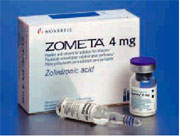
|
Price Guide I Order Forms I Contact Us I FAQ I Home |
|
|
|
|
Healthcare
professionals click here.
Norphar Prices: Drugs from Canada - Price in American Dollars.
Zometa, Zoledronic Acid (Prescription)
| Drug Name and Strength |
Generic Name |
Drugstore.com Price |
NORPHAR |
You Save |
| Zometa
1
vial (4 mg/5ml vial) |
Zoledronic Acid |
$920.04 |
$562.49 | 39% |
| Zometa
3 vials (4 mg/5ml vial) |
Zoledronic Acid |
$2,577.83 |
$1674.17 | 35% |
| Lupron
Depot (11.25 mg/vial) inj kit |
Luprolide Acetate |
$1,506.22 |
$952.14 | 37% |
Lupron
Depot |
Luprolide Acetate |
$604.56 |
$428.60 |
30% |
Lupron
Depot |
Luprolide Acetate |
$512.52 |
$341.83 |
33% |
| Lupron
Depot (30 mg/vial) inj kit |
Luprolide Acetate |
$2,405.67 |
$1,494.25 |
38% |
 |
Since currency values change daily use our Price
Guide |
Zometa, Zoledronic Acid
|
|
Note: |
Your health care professional my also give you vitamins containing Vitamin D and calcium |
|
It is important that your doctor check your progress at regular visits after you have received Zometa / Zoledronic acid. If your condition has improved, your progress must still be checked. The results of laboratory tests or the occurrence of certain symptoms will tell your doctor if your condition is coming back and if a second treatment is needed.
Along with its needed effects, a medicine may cause some unwanted effects. Although not all of these side effects may occur, if they do occur they may need medical attention.
Check with your doctor immediately if any of the following side effects occur:
More common
Black, tarry stools; blurred vision; cancer progression; chest pain; chills; confusion; convulsions; cough; dizziness, faintness, or lightheadedness when getting up from a lying or sitting position; fever; irregular heartbeat; lack or loss of strength; lower back or side pain; mood or mental changes, confusion; muscle pain or cramps ; muscle trembling or twitching, shaking of hands, arms, feet, legs, or face; nausea or vomiting; numbness and tingling around mouth, fingertips, or feet; painful or difficult urination; pale skin; shortness of breath, difficult or labored breathing; skin rash, cracks in skin at the corners of mouth, soreness or redness around fingernails and toenails; sore throat; sores, ulcers, or white spots on lips or mouth; sudden sweating; swollen glands; tightness in chest; trouble breathing with exercise; unusual bleeding or bruising; unusual tiredness or weakness; wheezing; worsening of cancer
Other side effects may occur that usually do not need medical attention. These side effects may go away during treatment as your body adjusts to the medicine. However, check with your doctor if any of the following side effects continue or are bothersome.
More Common
Abdominal pain; anxiety, nervousness, restlessness or irritability; bad, unusual or unpleasant (after) taste; back pain; bladder pain, bloody or cloudy urine; blistering, crusting, irritation, itching, or reddening of skin; bone pain; burning, crawling, itching, numbness, prickling, ?pins and needles?, or tingling feelings; change in taste; cracked, dry scaly skin; cracked lips; constipation; dehydration; diarrhea; difficulty swallowing; discouragement; dry mouth; ear congestion; fear or nervousness; feeling sad, or empty; frequent urge to urinate; hair loss, or thinning hair; headache; hyperventilation; irregular heartbeats; joint pain, or swollen joints; loss of appetite; loss of interest, or pleasure; loss of voice; muscle pain, stiffness or difficulty in moving; pain, swelling, or redness in joints; partial loss of feeling; nasal congestion, or runny nose; seeing, hearing, or feeling things that are not there; sleepiness or unusual drowsiness; sleeplessness, trouble sleeping, unable to sleep; swelling; swelling of leg; thirst; trouble concentrating; unusually cold, shivering; vomiting; weight loss; white spots on lips, tongue, or inside mouth
Other side effects not listed above may also occur in some patients. If you notice any other effects, check with your doctor.
 |
 |
|
Price Guide I Order Forms I Contact Us I FAQ I Home |